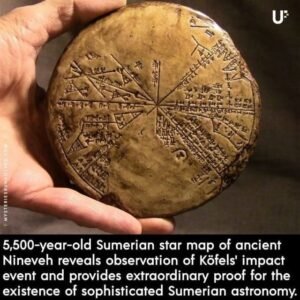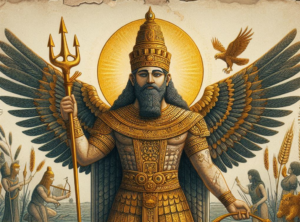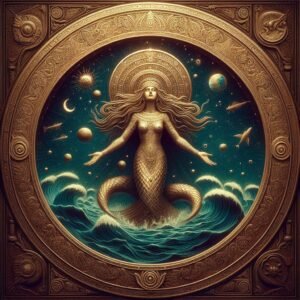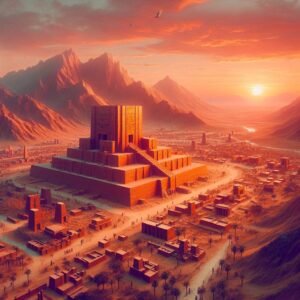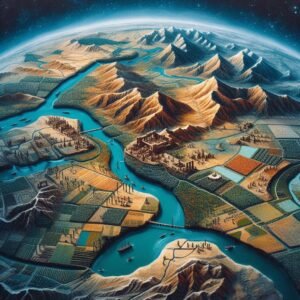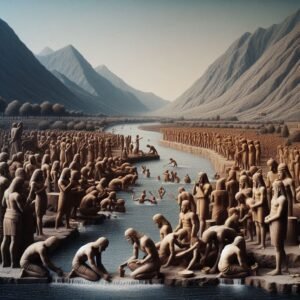The Nippur tablet, an ancient Sumerian artifact that is believed to hold significant clues regarding early astronomy and the astrological practices of the Sumerians.
Tag: Sumerian
Permanent link to this article: https://truthofself.com/the-nippur-tablet/
Jul 13
The God Utu
Permanent link to this article: https://truthofself.com/the-god-utu/
Jul 13
The God Ninurta
Permanent link to this article: https://truthofself.com/the-god-ninurta/
Jul 13
The Igigi lesser gods
The term “Igigi” refers to a group of mythological figures in Mesopotamian mythology. They are often considered the younger gods who served the Anunnaki, the major deities. According to the Atrahasis myth, the Igigi were tasked with laborious work for the Anunnaki until they eventually rebelled due to the harsh conditions.
Permanent link to this article: https://truthofself.com/the-igigi-lesser-gods/
Jul 13
The Goddess Ninhursag
Ninhursag, also known as Ninmah, Damgalnuna, Nintu, Belet-Ili, Shassuru, and Damkina or Ninursag, was an ancient Sumerian mother goddess associated with fertility, mountains, and the creation of life. She was one of the seven great deities of Sumer and was often depicted as a nurturing figure, symbolizing the earth and its ability to produce life.
Permanent link to this article: https://truthofself.com/the-goddess-ninhursag/
Jul 12
The God Enlil
Permanent link to this article: https://truthofself.com/the-god-enlil/
Jul 12
The Epic of Gilgamesh
Gilgamesh, the legendary king of Uruk, is a towering figure in ancient Mesopotamian mythology and is best known as the protagonist of the Epic of Gilgamesh, one of the oldest surviving works of literature. According to the Sumerian King List, Gilgamesh was the fifth king of Uruk and reigned in the early part of the Early Dynastic II period (circa 2700 BCE).
Permanent link to this article: https://truthofself.com/the-epic-of-gilgamesh/
Jul 12
The Goddess Ishtar
Ishtar, known as Inanna in Sumerian, is a deity of profound complexity and significance in Mesopotamian mythology, embodying the dualities of existence such as love and war, fertility and desolation. Her worship spanned across the ancient Near East, marking her as one of the most venerated figures in early human civilization
Permanent link to this article: https://truthofself.com/the-goddess-ishtar/
Jul 12
The Goddess Nammu
Nammu is a primordial goddess in Sumerian mythology, often associated with the creation of the universe and humanity. She embodies the primeval waters, an elemental force from which life and the pantheon of gods emerged. As a creator deity, Nammu’s role is pivotal in the cosmogony of Mesopotamian belief systems, where she is revered as the mother who gave birth to the major deities, including Enki, the god of wisdom, water, and creation.
Permanent link to this article: https://truthofself.com/the-goddess-nammu/
Jul 12
The God Enki
Permanent link to this article: https://truthofself.com/the-god-enki/
Jul 12
The God Anu
Permanent link to this article: https://truthofself.com/the-god-anu/
Jul 12
The Citadel of Erbil
Permanent link to this article: https://truthofself.com/the-citadel-of-erbil/
Jul 12
The Geography of Sumeria
Permanent link to this article: https://truthofself.com/the-geography-of-sumeria/
Jul 12
The Sumerian reverence for rivers
The Sumerians, deeply connected to the Tigris and Euphrates rivers that cradled their civilization, had a profound reverence for these waterways, which was reflected in their religious rituals. One such ritual was the ‘mîs-pî’, an intricate ceremony that involved the ‘washing of the mouth’ of divine statues, symbolizing purification and the induction of life into the idols.
Permanent link to this article: https://truthofself.com/the-sumerian-reverence-for-rivers/
Jul 12
The Sumerian Cities
Permanent link to this article: https://truthofself.com/the-sumerian-cities/

